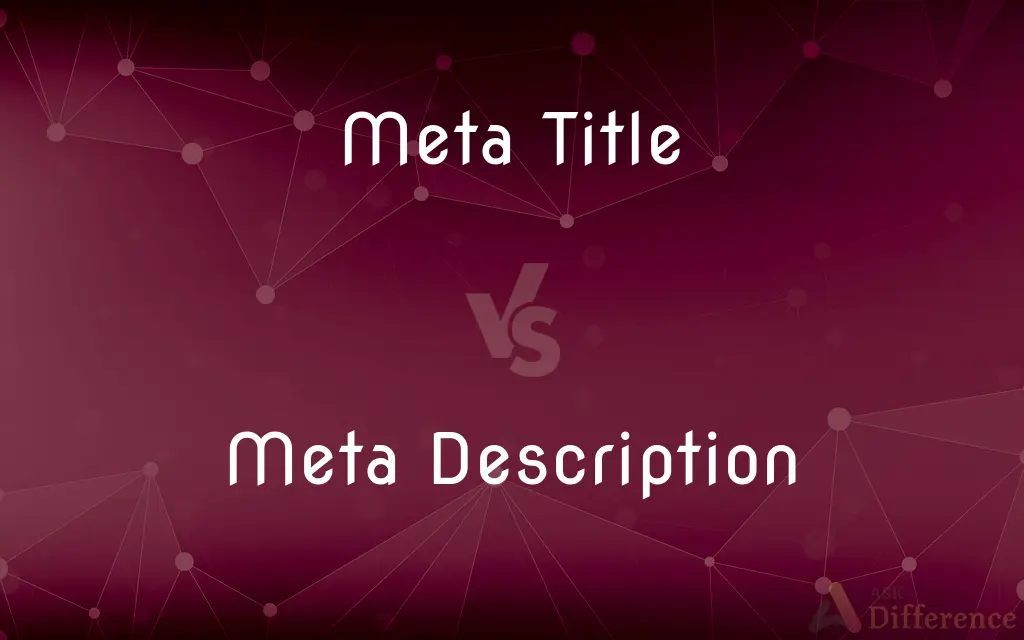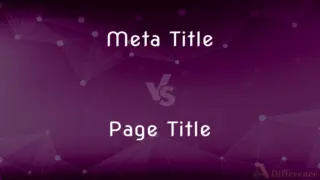Meta Title vs. Meta Description — What's the Difference?
By Tayyaba Rehman — Published on November 8, 2023
Meta Title is the title of a webpage seen in search results, while Meta Description provides a brief summary of that page's content.

Difference Between Meta Title and Meta Description
Table of Contents
ADVERTISEMENT
Key Differences
Meta Title is a critical element in search engine optimization (SEO) that appears as the clickable headline in search results. On the other hand, Meta Description is an HTML attribute that provides a concise summary of a webpage's content, serving as a brief snippet seen under the title.
While Meta Title directly influences click-through rates because it's the first thing users see, Meta Description offers a chance to expand on the topic and persuade the reader to click the link. Both are essential for effective SEO and attracting potential site visitors.
In terms of length, a Meta Title is typically kept between 50-60 characters to ensure it displays correctly in search results. Conversely, Meta Description is longer, usually around 150-160 characters, allowing for a more detailed summary.
Search engines, like Google, use the Meta Title to understand the primary topic of a page. Meanwhile, while the Meta Description doesn't directly influence a page's ranking, it can indirectly affect SEO by influencing click-through rates.
Both the Meta Title and Meta Description should be written with the user in mind, ensuring relevance and clarity to optimize user experience and maximize click-through rates.
ADVERTISEMENT
Comparison Chart
Purpose
Serves as the clickable headline in search results.
Provides a brief summary of a webpage's content.
SEO Impact
Directly influences click-through rates.
Indirectly affects SEO through influencing click-through rates.
Typical Length
50-60 characters.
150-160 characters.
Display Location
At the top of the browser and as the headline in search results.
Under the title in search results.
Primary User
Both search engines and website visitors.
Primarily website visitors for a deeper understanding of content.
Compare with Definitions
Meta Title
Meta Title serves as the headline in search engine results.
I clicked on the link because the Meta Title sounded interesting.
Meta Description
Meta Description provides additional context to the Meta Title.
While the Meta Title caught my eye, the Meta Description gave me more details.
Meta Title
Meta Title helps determine the page's relevancy to a search query.
Ensure your Meta Title contains keywords relevant to the content.
Meta Description
Meta Description doesn't directly impact search ranking but influences click-through rates.
Though Google doesn't rank based on Meta Description, it's crucial for user engagement.
Meta Title
Meta Title offers a snapshot of the page's content.
The Meta Title should align with the main topic of your article.
Meta Description
Meta Description serves as the descriptive snippet in search results.
A compelling Meta Description can persuade users to click your link.
Meta Title
Meta Title is the title tag of a webpage.
The Meta Title for our homepage is 'Best Online Store for Gadgets'.
Meta Description
Meta Description should be concise yet informative.
Your Meta Description should encapsulate the essence of your content in a few lines.
Meta Title
Meta Title influences user click-through rates.
A catchy Meta Title can significantly increase your webpage visits.
Meta Description
Meta Description is an HTML attribute summarizing webpage content.
The Meta Description gives users a sneak peek of the article.
Common Curiosities
How does Meta Title differ from Meta Description?
While Meta Title is the clickable headline, Meta Description offers a brief summary of the content.
What is a Meta Title?
A Meta Title is the title tag of a webpage displayed in search results.
How can I optimize my Meta Title for better results?
Use relevant keywords, ensure clarity, and make it compelling to users.
Is the Meta Description important for SEO?
While it doesn't directly influence rankings, it affects click-through rates, which can impact SEO.
Where is the Meta Title displayed?
At the top of the browser and as the headline in search results.
What is the typical length for a Meta Description?
Around 150-160 characters.
How should I write a good Meta Description?
It should be relevant, clear, and persuasive, providing a concise summary of the content.
How long should a Meta Title be?
Typically, between 50-60 characters to display correctly in search results.
How does the Meta Title affect user behavior?
A relevant and catchy Meta Title can increase click-through rates.
Do all search engines display Meta Descriptions?
Most do, but the display might vary slightly between search engines.
Should the Meta Title and Meta Description be related?
Yes, they should complement each other to provide users with a cohesive understanding of the page's content.
Does Google rank pages based on Meta Description?
No, but a good description can influence user behavior, indirectly affecting SEO.
Can I use the same Meta Title and Meta Description for multiple pages?
It's best to have unique titles and descriptions for each page for clarity and relevance.
Can I use special characters in my Meta Title?
It's best to be cautious; while some special characters are okay, others might not display correctly.
Why is my Meta Description not showing in search results?
Search engines might choose a different snippet from the page if they find it more relevant to the user's query.
Share Your Discovery

Previous Comparison
Meta Title vs. Page Title
Next Comparison
Phenol vs. Benzoic AcidAuthor Spotlight
Written by
Tayyaba RehmanTayyaba Rehman is a distinguished writer, currently serving as a primary contributor to askdifference.com. As a researcher in semantics and etymology, Tayyaba's passion for the complexity of languages and their distinctions has found a perfect home on the platform. Tayyaba delves into the intricacies of language, distinguishing between commonly confused words and phrases, thereby providing clarity for readers worldwide.












































